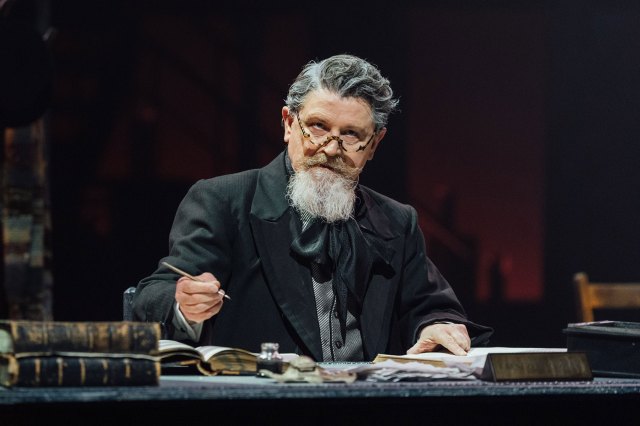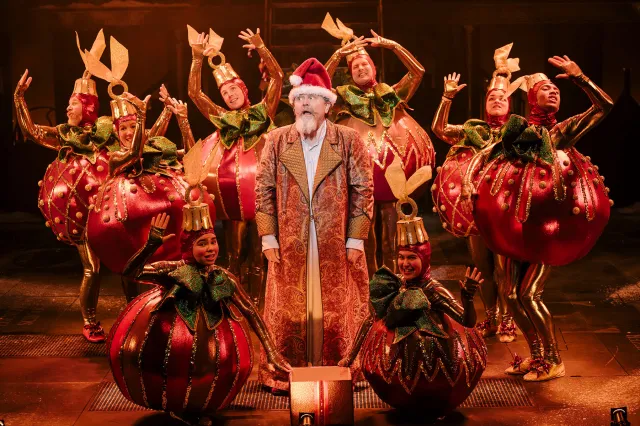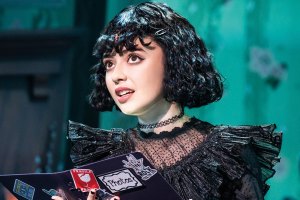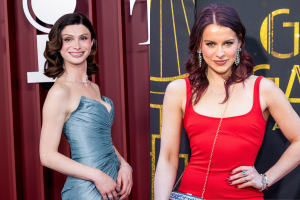A Christmas Carol at Leeds Playhouse – review
Amy Leach’s production, with an adaptation by Deborah McAndrew, stars Reece Dinsdale as Ebenezer Scrooge

Some eight years ago, Deborah McAndrew came up with a new version of A Christmas Carol for Hull Truck Theatre, setting the play around Hull docks, with Scrooge a manufacturer/trader. It proved an inspired choice. Now essentially the same text is being staged at Leeds, with Scrooge a West Riding factory boss, rooting him in 19th-century industry again, and it works perfectly.
Before the start of the play, the magic is there with brass band music (carols, of course) and a superb set by Hayley Grindle, sprawling all over the stage with factory chimneys and a raised balcony.
For a change, we see Scrooge in his finery, glowering down on his workers from the balcony. Reece Dinsdale, at least at first, is a touch younger than your typical Scrooge, a dominant, dignified figure, filled with genuine anger. The two charity workers hint at one of the problems of this generally excellent production. They flutter on in unison, very funny, but should Scrooge’s world at the outset be so exaggerated?
John Biddle’s music, with four actor-musicians in the ensemble, underlies much of the production, carols juxtaposed with percussive and emphatic modern song and clever underscoring of scenes. Personally – and this is clearly a minority view – I would have welcomed a less noisy approach, and the same applies to some of the crowd scenes. However, increasingly, the carols predominate to great effect.
The Playhouse takes its social responsibility extremely seriously, and there are a few Deaf actors in the ensemble. The Cratchits’ scenes are played in near-total silence, with compelling performances from Stephen Collins (Bob – and quite a few other comic turns as well) and Nadia Nadarajah (Mrs Cratchit, delivering a wonderful denunciation of Scrooge without saying a word).
The appearances of the ghosts are magnificently handled, with Obioma Ugoala‘s Marley a menacing figure in his mighty chains and Bea Glancy (all in white, with magical lighting) beginning Scrooge’s reformation with school and the Fezziwigs: a good idea, incidentally, to double Fred and Young Scrooge (Danny Colligan finding the joy in Fred that Ebenezer lost). Claudia Kariuki, with a troupe of dancing baubles, brings the house down as Christmas Present, and Christmas Yet to Come looms over the hapless Scrooge like a pillar of smoke.

Through it all, Dinsdale barely leaves the stage in an acting tour de force. From the aggressively dismissive opening, we see him beginning to question the scenes that confront him, attempting to take part, gradually crumbling to the desolate question, “Are these the shadows of things that will be?” and eventually communicating his joy that it is still Christmas Day.
Backing him up are an 18-strong group of actors, doubling and trebling like mad, plus three actors taking the part of Tiny Tim. Lucas Kerr won over the opening night audience with a remarkably assured performance, and no doubt the other two will seize their chances later on.
Director Amy Leach aims her production firmly at the Christmas audience (come to think of it, that’s what Charles Dickens did) and hits the mark consistently.















